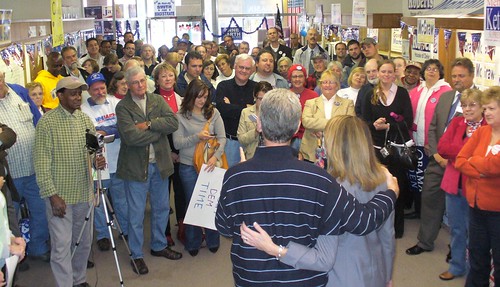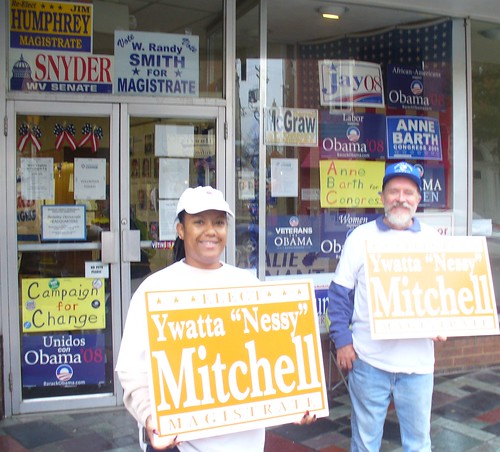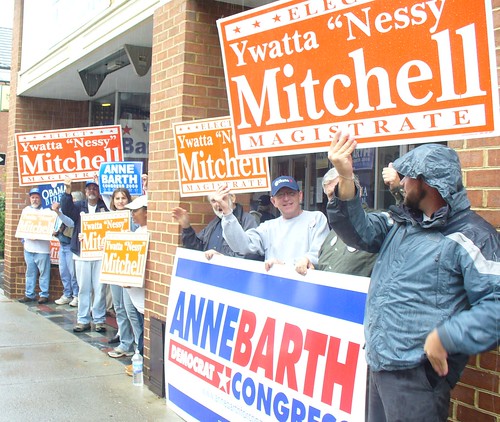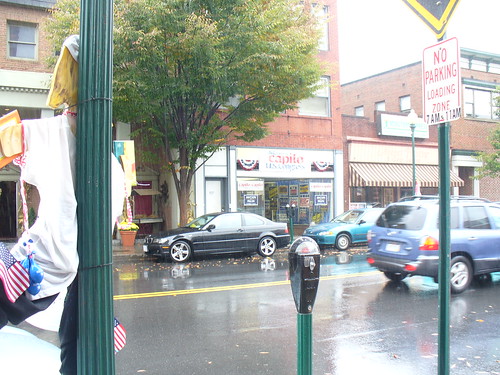Over and over again we’ve seen a pattern from Republican Rep. Shelley Moore Capito (R-Big Oil). When Democrats in Congress tried to take steps to do what the American people want and bring the troops home from Iraq, Capito called it “playing politics.” But when George W. Bush and his administration plays politics with the lives of troops, we hear only silence from her. So much for her “independence.” The only conclusion that can be reached: Capito likes it when Bush plays politics with the lives of soldiers.
Capito on March 23, 2007 regarding a Congressional bill in support of timelines:
“By giving our enemy a date-certain timeline for withdrawal, we are simply asking them to duck into the shadows and wait for us to leave. Such timelines hog-tie the hands of our commanders in the field and essentially hand our enemy a roadmap to victory.
Yet the Bush administration reached a timeline agreement with the Iraqi government as reported on Aug. 22, 2008 that sets specific dates.
A deal between American and Iraqi officials was given fresh impetus by Secretary of State Condoleezza Rice’s surprise visit to Baghdad on Thursday. Ms. Rice met with Mr. Maliki and other Iraqi leaders and confirmed that both sides saw the value in “aspirational timetables” to govern the continuing role, mission and size of American forces in Iraq.
She declined to discuss the timing, saying that to go into details of the talks “would be inappropriate at this time.” Instead, she reiterated the consistent American position that decisions must be based on events, not timetables.
…
Iraqi officials were more forthcoming with their interpretation of the draft agreement. In an interview by telephone in Baghdad, Mohammad Hamoud, the chief Iraqi negotiator, said that the draft contained two dates: June 30, 2009, for the withdrawal of American forces from “cities and villages” and Dec. 31, 2011, for combat troops to leave the country altogether.
But we heard nothing from Capito after Bush and the Iraqis agreed, in Capito’s own words, to giving the enemy “a roadmap to victory.”
Capito also on March 23, 2007 expressed her “belief” that decisions should be left to the commanders on the ground:
“Congress has the power of the purse, but it should not micromanage this war or any war by making decisions best left for those on the battlefield. I want our troops to come home, but I want that decision to be made by our commanders who are basing their decisions on the conditions on the ground and in what is best for the security of our nation.”
Yet we find out today from Bob Woodward’s interviews with Bush and those very same commanders on the ground and in the Pentagon that Bush made decisions for political reasons. He took the decisions out of the hands of the commanders and made the country less safe.
At the Joint Chiefs of Staff in late November 2006, Gen. Peter Pace was facing every chairman’s nightmare: a potential revolt of the other chiefs. Two months earlier, the JCS had convened a special team of colonels to recommend options for reversing the deteriorating situation in Iraq. Now, it appeared that the chiefs’ and colonels’ advice was being marginalized, if not ignored, by the White House.
During a JCS meeting with the colonels Nov. 20, Chairman Pace dropped a bomb: The White House was considering a “surge” of additional troops to quell the violence in Iraq. “Would it be a good idea?” Pace asked the group. “If so, what would you do with five more brigades?” That amounted to 20,000 to 30,000 more troops, depending on the number of support personnel.
Pace’s question caught the chiefs and colonels off guard. The JCS hadn’t recommended a surge, and Gen. George W. Casey Jr., the Iraq commander, was opposed to one of that magnitude. Where had this come from? Was it a serious option? Was it already a done deal?
Pace said he had another White House meeting in two days. “I want to be able to give the president a recommendation on what’s doable,” he said.
A rift had been growing between the country’s military and civilian leadership, and in several JCS meetings that November, the chiefs’ frustrations burst into the open. They had all but dismissed the surge option, worried that the armed forces were already stretched to the breaking point.
Where is Capito’s criticism that she made before of politicians making decisions instead of the “commanders on the ground”?
It was so important to her that Capito made that point the basis of another statement on Nov. 14, 2007:
“This is yet another politically motivated resolution by the Majority that would undercut the decision-making power of commanders on the ground in Iraq,” said Capito.
And yet that is what top Pentagon officials told Bob Woodward Bush did. Bush was motivated by politics at home to take away their decision to withdraw troops in order to have his escalation, his “surge” that they thought stretched the military to the breaking point and left the country with out a strategic reserve in the event of another crisis elsewhere:
The president was not listening to Casey’s boss, Gen. John P. Abizaid at Central Command, anymore, either.
“Yeah, I know,” the president said to Abizaid at a National Security Council session in December, “you’re going to tell me you’re against the surge.”
Yes, Abizaid replied, and then presented his argument that U.S. forces needed to get out of Iraq in order to win.
“The U.S. presence helps to keep a lid on,” Bush responded. There were other benefits. A surge would “also help here at home, since for many the measure of success is reduction in violence,” Bush said. “And it’ll help [Iraq Prime Minister Nouri al-] Maliki to get control of the situation. A heavier presence will buy time for his government.”
The rest of Iraq wasn’t as tenuous as Baghdad, Abizaid said. “But it’s the capital city that looks chaotic,” Bush said. “And when your capital city looks chaotic, it’s hard to sustain your position, whether at home or abroad.”
Clearly Bush was motivated by political reasons. Think that’s just my interpretation:
Pace, Schoomaker and Casey found themselves badly out of sync with the White House in the fall of 2006, finally losing control of the war strategy altogether after the midterm elections. Schoomaker was outraged when he saw news coverage that retired Gen. Jack Keane, the former Army vice chief of staff, had briefed the president Dec. 11 about a new Iraq strategy being proposed by the American Enterprise Institute, the conservative think tank.
“When does AEI start trumping the Joint Chiefs of Staff on this stuff?” Schoomaker asked at the next chiefs’ meeting.
Yet where is Capito’s criticism of Bush making “politically motivated” decisions that tied the hands of the commanders on the ground?
She made that criticism to justify her roadblocking of legislation to do EXACTLY what the generals were wanting to do – to pull the troops out to let the Iraqis take over. Yet we hear only silence from her now.
She’s not independent. She’s a coward who only does what Bush and the Republican leaders tell her to do. Capito knew the surge would not work. She said as much:
However, I have grave concerns regarding the call for increased American troop numbers in Iraq and am skeptical of this new plan’s success. I believe the escalating sectarian violence in Iraq requires a political solution, not a military solution rooted in increased numbers of American troops.
Never forget this. Despite expressing those “concerns,” Capito backed it anyway. She made the politically motivated decision to back Bush’s politically motivated surge and then she accused Democrats and Republicans who opposed the surge and sought to bring the troops home of tying the hands of the commanders in the field, when that is exactly what she supported George W. Bush in doing.
How many died since she made the decision to back the president playing politics with the lives of soldiers instead of standing up and representing the American people?
Capito shouldn’t be running for reelection. She should be hanging her head in shame.
We have a chance to elect a Congressional representative who wants to end the war in Iraq quickly and responsibly.
Here’s Anne Barth’s position:
We must focus on training the Iraqis to take responsibility for their own security soon, set benchmarks for the Iraqi military, and give more emphasis to diplomatic strategies.
The war in Iraq has had a serious impact on our military, and our brave men and women are stretched thin by extended deployments. In Congress, I will work to strengthen America’s national security and refocus on the terrorist threats around the globe that are currently ignored.
Look how closely it mirrors the exact view held by the commanders on the ground – the same ones whose views Capito said were so important and for years she ignored as Bush played politics and others paid the ultimate price.
…
More on Anne Barth here. More on Capito here.
Our West Virginia Blue Act Blue page for Anne Barth here.






